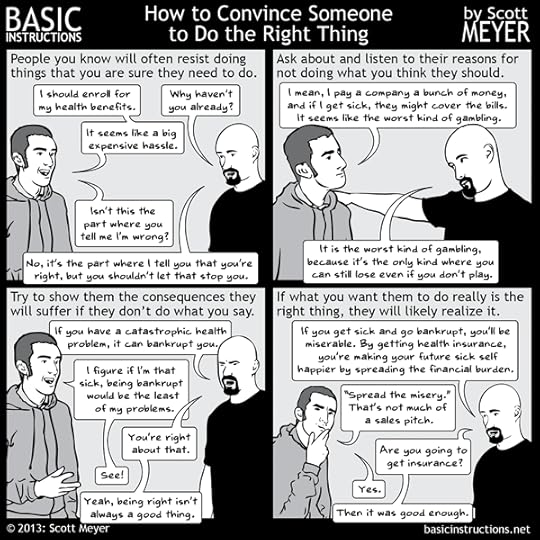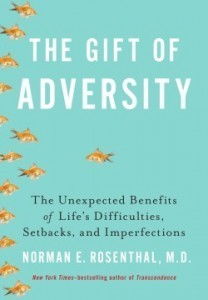Hillary Rettig's Blog, page 19
October 1, 2013
How to Convince Someone to do the Right Thing (Includes “Basic Instructions” Cartoon!)

The TOP LEFT FRAME offers an excellent illustration of the principle that our reasons for procrastinating are always valid.
So, the thing to do when you’re procrastinating is to skip the whole “What’s wrong with me?” shame spiral, and simply ask yourself, “Why?” In the cartoon, Goatee Guy helpfully does this for Hoodie Man. Then, Goatee helpfully affirms the validity of Hoodie’s concern (“a big expensive hassle”), while reminding him that procrastination isn’t the best response.
In the TOP RIGHT FRAME Goatee listens carefully as Hoodie explains his position.
Listening is respectful, yields useful information, and also helps the other person be more accepting of your information and viewpoint. (My go-to book on this topic is How to Talk So Kids Will Listen and Listen so Kids Will Talk by Adele Faber and Elaine Mazlish, a classic parenting book I strenuously recommend for nonparents, as well.)
Notice, also, that, as much as Goatee wants Hoodie to get insurance, he doesn’t blow smoke. He admits that health insurance is a lousy gamble, but reminds Hoodie that, even when you don’t like your choices, it’s still important not to procrastinate.
Much of the time when we procrastinate it is because we don’t like our choices. When that happens:
(1) Make sure you’re seeing the situation as clearly and objectively as possible. Sometimes we respond defensively or reflexively or simply out of habit.
(2) Make sure you’re aware of all your options: we often miss a few. (Talking with a trusted friend or advisor can help.) And,
(3) Accept the situation for what it is, instead of comparing it with the fantasy of how you wish it were, or someone else’s “better” situation.
And you’ll have an easier time taking action.
In the BOTTOM LEFT FRAME, Hoodie is dichotomizing, or seeing the situation in black/white, either/or terms.
Since the bankruptcy wouldn’t be his most serious problem, he’s framing it as a trivial problem: that’s either/or thinking. Dichotomization is a perfectionist characteristic.
Goatee’s response is interesting. I think he’s trying to convey to Hoodie the difference between being merely clever and truly wise. Perfectionism, being reductive, can usually come up with snappy answers, but those answers will almost certainly be wrong. Perfectionism is inherently delusional, and you should never make important decisions–or any decisions–out of a perfectionist mindset.
And in the BOTTOM RIGHT FRAME, Goatee corrects Hoodie by reminding him that, even when one is very sick, bankruptcy is still awful, and will make the situation far worse.
This helps restore Hoodie’s perspective, and helps him make the right decision.
I would have liked the cartoon a wee bit better had Goatee offered to help Hoodie through the first step of the difficult process of buying health insurance, or maybe even the whole thing. (A process that, just this week, got a whole lot easier – thank you President Obama and Democrats!)
Notice, by the way, what Goatee Guy did not do: nag. Nagging is almost always counterproductive.
More Basic Instructions here. Thanks again to Scott for permission to reprint!
I’m Interviewed at the Vegan Business Connection
You can learn about my current and past work here; also some tips for entrepreneurs. Link
September 30, 2013
If You’ve Ever Wanted to See a Seven-Tuba Pileup, Now is Your Chance
I don’t often repurpose a blanket rack as a scarf and jewelry holder…
…but when I do, the result is so good I just have to share it…

I have this preconception about myself that I’m not so good at home decor, so when I do come up with a clever idea it feels great.
Plus, the rack was $10 off CraigsList – so score!
September 26, 2013
Guest Post: Your Power Zone
Second guest post by Linda Marks. Given that, the older I get, the more life seems like a balancing act, the below rings very true. When reading it, bear in mind that procrastination and underproductivity are caused by disempowerment. So, we can infer that moving too far along any of the dimensions Cedar identifies can lead to procrastination. – Hillary
Cedar Barstow of Right Use of Power defines power as “the ability to have an effect.” She underscores the truth that “how we use this ability is the difference between abuse of power and use of power for good.” Cedar has identified four different dimensions with goals that relate to power, each of which has two polarities. When we tend to behave at one extreme or the other, we find ourselves losing power. When we work to find a balanced place in the middle of each continuum, we can live in “the power zone.” Here are the four dimensions Cedar has identified:
Be informed and aware

The secret to keeping your balance is to find your center!
Goal: Use power to evolve relationships and situations.
Polarities: Too little information (which creates information) and Too much information (which creates overwhelm)
Task: To find and utilize just the right amount of information to make well-thought out decisions.
Be sensitive and compassionate
Goal: Use power with both heart and strength
Polarities: Over-focus on self (self-absorption) and Under-focus on self (unconsciousness)
Be connected and accountable
Goal: Use power to prevent, resolve and repair harm.
Polarities: Over-responsible (introjection/shame) and Under-responsible (projection/blame)
Be skillful and wise
Goal: Use power to promote well-being and serve the common good
Polarities: Over-attached (unable to let go) and Under-attached (unable to hold on)
For more information: http://www.rightuseofpower.com/power-polarities-ethical-wisdom/
Guest Post: Soul Mates and Wound Mates
Below, one of the best essays I’ve read about relationships anywhere. I hope it’s as meaningful and useful to you as it was to me! It’s the first of two guest posts by Newton, MA-based Linda Marks, MSM, a super-smart and innovative psychotherapist, lifework counselor, and author. Her newsletter is one of the first things I read when it shows up in my inbox, and you can subscribe for free at her blog. More info on Linda here, and thanks to Linda for kind permission to reprint! – Hillary
 So many of us wish to meet a “soul mate,” another human being with whom we share a deep connection, with whom the level of intimacy seems rich and endless, and where we may feel like we’ve known the other person forever, even when we have just met them. With a soul mate, we can talk about seemingly anything, and the potential for joy, growth and fulfillment through relationship seems profound and exquisite. What we often don’t take into consideration, and may not be aware of, is that when we have a deep connection with another person, not only do our most positive qualities have the opportunity to shine, but also our shadow parts come to the surface as well.
So many of us wish to meet a “soul mate,” another human being with whom we share a deep connection, with whom the level of intimacy seems rich and endless, and where we may feel like we’ve known the other person forever, even when we have just met them. With a soul mate, we can talk about seemingly anything, and the potential for joy, growth and fulfillment through relationship seems profound and exquisite. What we often don’t take into consideration, and may not be aware of, is that when we have a deep connection with another person, not only do our most positive qualities have the opportunity to shine, but also our shadow parts come to the surface as well.
Deep connections, because they are safe and far reaching, allow us to connect with our undeveloped, unhealed and unexamined parts so that we may heal and integrate them as we grow. When we do this critical shadow work, the rewards are soul rendering. However, if we do not realize that with soul connection comes soul work, we may run from this important opportunity for growth, sometimes abandoning ship–our own and the one we share with a soul mate.
(to continue, click on arrow at right)
My colleague Jeff Brown, one of the most brilliant articulators of matters of the heart I know, has made a beautiful and very helpful distinction: soul mates and wound mates. A wound mate may be a soul mate who is not ready, willing or able to do the essential soul work needed to grow, both for oneself and in relationship. As a result, Jeff says the wound mate relationship is sourced “in unresolved emotional patterns, issues and holdings.” Instead of recognizing what is being brought to the surface and mining it for gold, “wound mates just flounder in the mud, trigger after trigger, downward spiral after downward spiral.”
From a soul point of view, this kind of relationship really is a waste. To do our soul work, to point the finger inwards rather than outwards, takes great courage and consciousness. Yet, the fruits of such efforts are sweet and rare. If two soul mates do their work, they can bring out the best in one another and be the wind under one another’s wings. If they run from the dark side of the mirror, they can feel as though they are clipping one another’s wings and holding one another down or back. How sad it is when instead of recognizing that shadow work can bring us closer to ourselves and our loved ones, we run away, shut down, or reject the very source of love who at first appeared to be a gift from God. Perhaps even having this frame of soul mates and wound mates can help bring more awareness to the delicate dance of love, intimacy and relationship.
September 19, 2013
Do You Suffer From Marketer’s Block?
Recently, I’ve noticed an interesting evolution in the writing productivity classes I teach.
Up until a few years ago, writers almost always took one of my classes because they were procrastinating or blocked on a book or other work. These days, however, many who take my classes have finished their book: it’s their marketing they’re stuck on.
And many of those who are stuck are indie publishers.
What gives?
To understand what’s going on, you first need to understand that procrastination isn’t caused by laziness, lack of discipline, lack of commitment, or any other lack, but disempowerment. Disempowerment means you’re not missing anything; just separated from, or constrained from using, that which you have. Locate and remedy the disempowering forces in your work and life, and your energy, discipline, commitment, etc., will “automagically” reappear. Here’s more info on how to do that.
So what would disempower an indie publisher?
(Click arrow to continue.)
The major disempowering forces are: perfectionism, ambivalence, resource constraints, unmanaged time, ineffective work processes, traumatic rejections, and a disempowering career path. I characterize them all, and detail their solutions, in my book The 7 Secrets of the Prolific. Perfectionism is the most serious because it undermines you in many ways, and also impairs your ability to solve the rest.
 But let’s look at that last one: disempowering career path. In the bad old days of traditional publishing, writers slogged away for years in a fundamentally disempowering system. You took years to write a novel; an editor or agent held onto the manuscript for months and then decided its fate in a few minutes (if you were lucky). And often, depending on how your publisher treated you and your work, getting accepted only brought on more disempowerment, since you would have little or no say over your book’s cover, editing, and marketing.
But let’s look at that last one: disempowering career path. In the bad old days of traditional publishing, writers slogged away for years in a fundamentally disempowering system. You took years to write a novel; an editor or agent held onto the manuscript for months and then decided its fate in a few minutes (if you were lucky). And often, depending on how your publisher treated you and your work, getting accepted only brought on more disempowerment, since you would have little or no say over your book’s cover, editing, and marketing.
In such a situation, where the odds are really stacked against a writer’s success–especially if your work isn’t trendy, or otherwise easily salable–procrastination actually makes sense as a way of “opting out” of an unfair and hopeless-seeming system. So that’s what many blocked writers were doing: rebelling. This example illustrates two core features of procrastination:
Our reasons for doing it are always valid. Always.
It’s a suboptimal response to a bad situation. Procrastination isn’t a character flaw; it’s simply a coping strategy. And it’s even okay (and entirely human) to procrastinate once in a while. However, as a primary coping strategy, it’s a disaster, and leads to a life of unfulfilled bitterness.
Cut to 2013, and the glories of indie publishing.
Most readers of the Newbie’s Guide to Publishing blog know that indie is a a major liberating and empowering force for writers. As Joe himself recently wrote: “It truly is the best time in history to be a writer. The are no longer any boundaries. You can work with whomever you want to, at your own speed, get paid monthly, write about anything you want, do very little marketing, and still reach readers….What an amazing, incredible time to be alive. How lucky we all are.”
I concur! I indie published the 7 Secrets, and wound up with a book I truly loved that is now helping many people and selling hundreds of copies a month in electronic and paper formats. Like many successful indie publishers, my main problem is not the disempowering drudgery of dealing with capricious and uncaring publishers, but finding the time to replicate my success by writing and marketing as many other books as possible. Believe me–it’s a much better problem to have!
Which brings us to all the cases of Marketer’s Block I’m seeing.
I think what’s happening is that many writers, who finally see themselves as having a realistic path to publishing via indie publishing, are no longer feeling disempowered when writing. And so they’re finishing their books.
But then, after they start to market, it’s a whole other story. Suddenly, they realize that marketing is not just a much bigger process than they had envisioned, it’s also much slower. They had dreams of winning readers by the dozens or hundreds, but instead they’re winning them a few (or one!) at a time, in what seems like a painfully slow effort.
They’re also discovering that, while it’s fantastic to have access to a superabundance of great marketing tools, it’s also overwhelming. For many writers, figuring out the right mix of marketing tools and techniques is a constant challenge that’s only getting tougher. A year ago, for instance, few writers had heard of email direct marketing companies like BookBub, BookGorilla, and BookBasset, but now they’re all the rage.
It can all lead to a kind of overwhelm, decision fatigue, “analysis paralysis,” and the feeling of disempowerment that leads to procrastination.
So what to do?
Here are some techniques that will help:
Acknowledge that you’re in a business. The writers who succeed are those with the clearest vision, and what they see most clearly is that indie publishing is a business. So they educate themselves on business (visit SBA.gov to learn about free resources in your area) and conduct themselves like businesspeople. ALL businesses, whether they’re selling shoes or salsa or science fiction, require lots of marketing and sales; and the best any business can offer is a decent return on an investment, which means that to succeed, you need to be be prepared to make initial investments of money, time, and attention.
Relatedly, lower your expectations. Forget about the overdramatized, reductive, and probably untrue “overnight success” stories the media constantly pushes–they’re not the norm. Indie publishing, like most businesses, is a long term endeavor, so work hard, moderate your expectations, and relish even your small successes (which probably aren’t as small as you think).
 Don’t compare. In practically every class I teach, sooner or later someone starts complaining about Fifty Shades of Grey–how bad it is, how unfair it is that it’s a bestseller, how much the world sucks for “real writers,” etc. (It used to be Twilight, by the way–writers can always find someone to envy; and while I’m at it, let me remind you of Joseph Epstein’s famous quote that, “Of the seven deadly sins, only envy is no fun at all.”) It doesn’t matter. Focus on writing the best books possible, and on doing the best possible marketing for those books, and your odds of a success that will be satisfying, if not stratospheric, will soar.
Don’t compare. In practically every class I teach, sooner or later someone starts complaining about Fifty Shades of Grey–how bad it is, how unfair it is that it’s a bestseller, how much the world sucks for “real writers,” etc. (It used to be Twilight, by the way–writers can always find someone to envy; and while I’m at it, let me remind you of Joseph Epstein’s famous quote that, “Of the seven deadly sins, only envy is no fun at all.”) It doesn’t matter. Focus on writing the best books possible, and on doing the best possible marketing for those books, and your odds of a success that will be satisfying, if not stratospheric, will soar.Work on your perfectionism. Because it is the main brake on your productivity and success. It’s not at all the same as having high standards; it’s a toxic brew of unreasonable expectations, harsh self-punishments, grandiosity, shortsightedness, reductionism, dichotomization, and more. For the complete description, click here. And for the solutions, click here.
And, finally, Have fun. Because Joe is right: this is a golden age for writers. The problem we have is the one we want to have: too much opportunity. It’s the problem of the proverbial kid in the candy store, and, like the kid, all we have to do is pace ourselves and we’re in for a great time.
September 10, 2013
When Adversity Strikes Be Sure You’re Framing It Properly
New York Times health columnist Jane Brody writes about a new book, The Gift of Adversity:
The book’s titular message — that adversity can be a gift — is especially relevant now, as millions of Americans who have lost jobs struggle to reinvent themselves. After 20 productive years as a researcher at the National Institute of Mental Health, Dr. Rosenthal felt he was essentially forced out by new leadership.
 “This kind of thing happens to many people in all fields,” Dr. Rosenthal wrote. “Sometimes you need to accept that it’s time to move on — and to do so.” And so he did, becoming an independent clinical researcher, private clinician and, perhaps most important of all, an author of science-based nonfiction written in an entertaining and accessible style.
“This kind of thing happens to many people in all fields,” Dr. Rosenthal wrote. “Sometimes you need to accept that it’s time to move on — and to do so.” And so he did, becoming an independent clinical researcher, private clinician and, perhaps most important of all, an author of science-based nonfiction written in an entertaining and accessible style.
In an interview, he offered this message to people in midlife who have lost jobs: “Accept the situation and view it as part of a national trend, not a reflection of your personal worth. Reach within yourself to see what else you can do, what you value, then cultivate it. There are lots of opportunities out there, skills you can upgrade, and new skills you can master.”
He cautioned against comparing oneself to others more fortunate, which can lead to depression. He suggested that older job seekers emphasize their advantages over the young: wisdom, judgment, interpersonal skills and experience, all of which can foster creative thinking and effective teamwork.
The moral of his departure from the institute: “Look within to gauge your worth rather than depending on institutions or the opinions of others, for institutions rise and fall and fashions come and go, but a good sense of your own value will see you through life’s ups and downs.”
It is a lesson I had to learn midcareer, when my confidence was nearly shattered. At the time I worked under an editor who disliked me or my work — or both. He repeatedly ripped my copy to shreds, leaving me in tears and wanting to quit.
But before I relinquished what to me was the best job in the world, I figured out a strategy that worked: writing articles edited by others. Soon after, the editor moved on, and I returned to writing what I and my readers enjoyed.
The point: often faith in oneself prevails over temporary obstacles.
True, sometimes we have only ourselves to blame for these obstacles. Yet mistakes, if dwelled upon, can easily erode a person’s ego. My late husband once told me he remembered every mistake he’d ever made, which may have contributed to his propensity for depression.
The message may seem a little “pat” but it isn’t. It also isn’t inimical to recognizing the societal roots of personal suffering. There’s a difference between a shallow positiveness and what this article is discussing, which is to frame your situation in the most positive, healing, and useful way. The latter is a crucial life skill no matter what your situation or political orientation.
Also, not comparing yourself with others, and not looking outside for validation–especially when society’s values conflict with your own–are always good advice.
September 8, 2013
Don’t Forget to Check Out My September Online Classes!
Online courses are convenient, cheap, and fun–and you can be located anywhere!
Take a class now and have a productive fall!
September 5, 2013
Live From Kalamazoo: A New Shot at Love
A little over a year ago, I was invited to write a letter to a newborn baby, Toby.
In it, I wrote about the benefits of being generous, and in particular generous in love: (
“I’ve also given away lots of love. Often that love was returned, but sometimes it wasn’t, which was painful. But as Billy Joel sings in The Longest Time, “I have been a fool for lesser things.” I believe it is always worth taking a chance for love.”
I remember hesitating after writing that: would I come across as pathetic or needy? Was the Billy Joel reference too common? (Maybe I should have quoted someone more “intellectually impressive”?)
But I went with it, and was glad I did. Honesty and boldness are their own rewards, since they help you overcome shame and feel more secure in your own skin. And I did get a couple of emails from people who said my email inspired them to take some risks in love.
Here’s the incredible thing, though…
 Not two weeks after writing that letter, in the kind of coincidence you would scorn if you saw it in a book or movie, I re-met a man I dated thirty years ago (when I was 19!), and we became a fast couple. Jan was newly single after a 27-year marriage, and had come to Boston on sabbatical. We hadn’t been in touch at all during those thirty years, save for a couple of emails after each of my books was published. But we were able to pick up immediately from where we left off, and it was great!
Not two weeks after writing that letter, in the kind of coincidence you would scorn if you saw it in a book or movie, I re-met a man I dated thirty years ago (when I was 19!), and we became a fast couple. Jan was newly single after a 27-year marriage, and had come to Boston on sabbatical. We hadn’t been in touch at all during those thirty years, save for a couple of emails after each of my books was published. But we were able to pick up immediately from where we left off, and it was great!
Because my work is portable and his isn’t—he’s a physics professor at Kalamazoo College—and because being in a relationship is important to me, it was a given from the beginning that I would move to Kalamazoo if things worked out. (The word Kalamazoo, by the way, derives from the Potawatomi for “boiling waters,” a reference to the fast-moving Kalamazoo River. However, I tell Easterners it actually translates to “twice the real estate at half the price.”)
And so, here I am! In a new living situation in a new city, in a new part of the country; buying new furniture with a new partner. It’s not really the thing you’re “supposed” to be doing at age 54: you’re supposed to be more settled. And it’s not always easy. But I’m beyond grateful to be facing this particular set of challenges. I know many people who are facing, or have faced, much worse, including my parents, who were settled in their fifties, but in the most miserable way.
Happy to be “Happy Enough”
It’s funny: I’ve been thinking about this newsletter for months, and have written it in my head probably a dozen times. I’ve always imagined it to be a cheerful and upbeat missive. But now that I’m actually in Kalamazoo and writing it, I feel more reflective, and even humble. I’m aware that I lucked out spectacularly with Jan—and being the beneficiary of great luck is humbling.
For another, love now seems a more complex phenomenon than it did when I was younger. Like everyone else our age, Jan and I have complicated pasts, and we carry those pasts with us into the future.
Finally, even though we hope our future will be glorious, we obviously can’t predict anything. At our stage of life, we can reasonably expect, at the very least, some health challenges. So happily-ever-after is even more a reductive, perfectionist (http://www.hillaryrettig.com/perfecti...) myth at this age than it was when I was younger.
But we can be happy enough: and that, in itself, is worth the struggle.
I will leave you, optimistically, with the great George Eliot (from Adam Bede):
“How is it that the poets have said so many fine things about our first love, so few about our later love? Are their first poems their best? Or are not those the best which come from their fuller thought, their larger experience, their deeper-rooted affections? The boy’s flute-like voice has its own spring charm; but the man should yield a richer, deeper music.”



